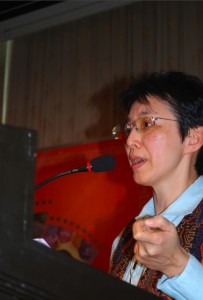CHIANG MAI, Dec 11 (TerraViva) – Efforts to get more Mekong authors published are being complicated by the downturn in the publishing industry, still-young publishing cultures, readers’ tastes and the challenges of working in English. Most of the books about the Mekong region and its countries are written by external authors, prompting initiatives like that of the Chiang Mai-based Silkworm Press, whose Mekong Press imprint was created to encourage local authors to reach external audiences through books.
Most of the books about the Mekong region and its countries are written by external authors, prompting initiatives like that of the Chiang Mai-based Silkworm Press, whose Mekong Press imprint was created to encourage local authors to reach external audiences through books.
“The bigger market is still westerners,” Trasvin Jittidecharak, founder and director of Silkworm Press, based in this northern Thai city told a session called ‘Reading Mekong Authors’ at the Mekong Media Forum.
“I’ve learnt that even a cookbook, they (readers) won’t buy it from the local [Thai] authors because they’re not sure that they can do it in their kitchen in Germany or France. So they prefer the French or German who writes about Thai recipes because then they understand that they can manage it at home,” she said.
“They’re insecure, they’re willing to listen to people who can’t even pronounce their name,” she added. “I think it’ll take another ten years (before they accept Asian authors).”
The lack of local authors can also be attributed to a ‘self censorship’ culture in the region, maintained Trasvin. “(We think) ‘Oh that’s not nice, we don’t write that, we don’t criticise our parents…’ We have all sorts of worries! And we didn’t realise that we’re not used to expressing (ourselves) at all,” she said.
“We don’t have the culture of book criticism, reviewing… and we have to learn how to break through this barrier of our own thinking,” she added.
The Mekong region comprises China, Burma, Thailand, Laos, Thailand and Vietnam.
“Not everyone speaks everyone else’s language, and it’s it needs to be respected that someone should be allowed to express themselves in their language. There a need to cross the language barrier,” said Alan Feinstein, a senior fellow of the Nippon Foundation’s Asian Public Intellectuals Fellowship programme and moderator of the session.
“Here, publishers play that role because it’s another social service they provide to people – to open up local reader’s eyes to what’s available in other languages,” he added.
Trasvin explained, “English is a common language for academics everywhere….We want our own thinking to reach the West. Otherwise, the West is just making comments or writing (about) us and we have no way to speak back or express our thinking, our thoughts to them.”
I n 2006, Trasvin founded Mekong Press alongside Silkworm as a non-profit foundation that specialises in publishing English-language books from authors from the Mekong region. It also provides workshops and training for authors.
Within the Mekong region, Thailand, China, and Vietnam have a relatively developed publishing industry and market compared to their neighbours, noted Trasvin. Laos, Cambodia and Burma have “no real money into it (the publishing industry), nobody is investing in it,” she added.
The trends in the print industry are far from encouraging, given the global slowdown in readers given the advent of the Internet and the new media.
Despite having 2,500 bookstores and 500 publishers in the country, Thai bookstores saw only 1,112 new titles per month last year, which is five to 10 times lower than that of developed countries, according to the Publishers and Booksellers Association of Thailand. They also estimated that Thais read only two books for pleasure per year, and spend about 8.56 U.S. dollars on books each year.
“We’ve chosen to do it (Mekong Press) because we wanted to at least make it (publishing) accessible,” said Trasvin. “Like I’ve always said, little is better than none.” (JChong)







